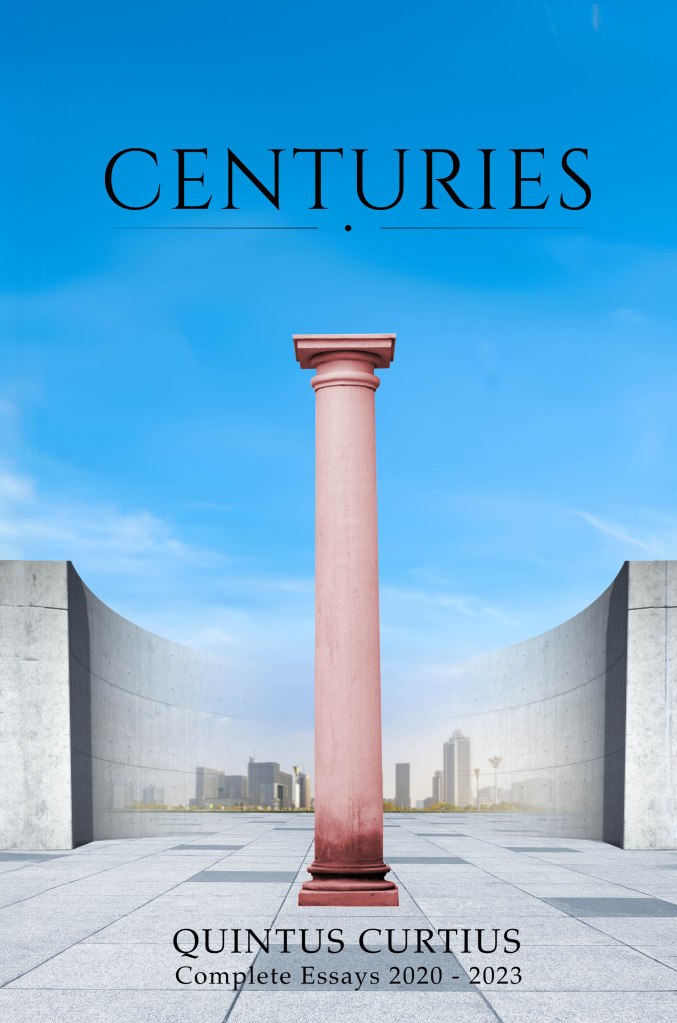
Centuries, the complete collection of my essays from 2020 to 2023, was released today. The Kindle and paperback versions are currently available, and the hardcover version will be available in the coming days. The essays deal with varied topics in moral philosophy, history, and biography. In addition to essays, the volume also includes a special collection of aphorisms and maxims under the chapter “Gnomology.” An enduring source of practical wisdom and inspiration, these timeless writings are unified by, and imbued with, a passionate belief in direct experience, moral structure, and endurance in adversity. The full table of contents can be found here.
Below is an excerpt from the Preface. As readers will recognize, it distills many of my core beliefs. I find it also suitable for reading aloud:
Historians and observers of human affairs are reflexively inclined to seek external causes for the florescence and decay of societies. Deeper examination into the causes of these processes, however, reveals that the same moral factors, diffusing predictably through the bodies of civil states, ultimately determine their trajectories. Hence nations in their austere and strenuous infancies will embrace an ethic of patriotism, social obligation, and masculine virtue. It is an ethic that scorns material pleasures and upholds the collective good, martial prowess, and the fortitude of character needed for communal survival.
Yet as wealth and leisure grow, and material comforts begin to soften the astringence of cultural restraint or modesty, a nearly imperceptible process of corruption is initiated, which begins first in the upper classes and finally percolates through the rest of the society. Luxury replaces propriety, and indolence triumphs over sacrifice; cynicism and nihilism overwhelm idealism, and the concern for the collective good is lost in an insatiate quest for individual satisfaction.
The experience of history shows that material comforts make men more ready to abandon themselves to the unrestrained sway of their flagitious propensities. Men are always more inclined to follow the example of evil than of good; for the promise of swift gratification holds more allure than the lasting rewards derived from patient and incorruptible effort. Mediocrity is easily contented. He who has no sturdiness of character will claw eagerly at empty pleasures and transitory stimulation, while the man of substance and understanding will seek distinction through goals that manifest his superior merit. The delusive influence of physical allurements cause a man to forget the destiny of his soul, and siphon his energies into activities that not only are of no use to him, but are in fact harmful to him. He who devotes his attentions to these seductions finds himself in the position of the dog who, beguiled by the residual scent of meat adhering to a discarded bone, gnaws it until his mouth becomes raw and bloody.
Running concurrently with moral decay is a decline in physical vigor. Men in such a condition are no longer willing to engage in honest labor; they find refuge in timidity and fear, and become reluctant to shoulder the rigors of life. They laugh at patriotism, and become numb to the glories of martial virtue. A lust for riches and corporeal pleasure infects their minds, and dulls their appetite for principled enterprises. Those who occupy positions of power sit in complicit silence, and either refuse to halt the physical and moral deterioration of their countrymen, or actively encourage it. While a hundred excuses and evasions are offered, nothing can conceal the fact that moral cowardice remains the fundamental cause of their passivity or collaboration. They pretend to honor the old ethics, and when necessary mouth the appropriate platitudes for their own gain; but no one believes their empty words, because they know words not confirmed by personal example mean nothing. Where there is no example, there can be no trust: nihil exemplum, nihil fiducia. Politics becomes an exercise in paralysis, for political factionalism and civil discord are inevitable when avarice and individualism have been raised to the status of creeds.
Yet this somber prognosis is tempered by the latent potential of every individual to attain virtue and perform noble deeds. The arrangement of man’s limbs, his physical prowess, the configuration of his intellect, and his inherent power to act in a manner befitting a divine creation, all demonstrate that man has been designed from birth not only to acquire the principles of virtue, but also to implement them through ingenious actions. The study of wisdom offers a path of redemption, a way for a man to remake himself, rise above his circumstances, and touch, so to speak, something that is immortal and divine. Every man, through his own examination of virtue and character, can condition himself to transcend the strictures of his environment and act as an example and leader for his peers. While this road is an arduous and solitary one, it is the only path that offers a guarantee of true freedom, a quiescence of soul, and a measure of lasting glory.
This greatness of soul—this magnitudo animi spoken of by Cicero—is not a destination achieved easily. It is, instead, the product of years of painful life experiences combined with dedicated reading and philosophical reflection. No one arrives at eminence or wisdom except through personal danger or sacrifice. Yet the grandeur that is voluntarily attained through virtue is more desirable than anything else, because it cannot be gifted by any divine power. It must be the product of one’s own exertions. While a man might credit his riches and other material gains to divine favor, no man ever ascribed to a supernatural power the virtue won through his own sweat and toil. “No one,” says Cicero in On the Nature of the Gods, “ever attributed earned virtue to a god.”[1] But while the seeds of wisdom are contained within every man, they remain latent until coaxed into germination by study and life’s trials, just as the sparks that create fire cannot be produced unless flint and steel are brought into collision by experienced and energetic hands.
Men seek wisdom for four reasons: first, to enhance their tranquility of mind; second, to augment their riches and physical comforts; third, to assist them in achieving their goals; and fourth, to have something of value to pass on to those they deem worthy. Yet the reading of history and philosophy without reflection and action remains an arid enterprise. The lessons of wisdom will remain devoid of profit, and will not engrave themselves on the heart, unless the reader’s acquirements become incentives for efficacious undertakings. The man who accumulates knowledge without understanding receives scant reward for his pains. He is like the farmer who has been given the seeds of an unfamiliar crop, which he knows neither how to sow, how to raise, nor how to reap; or he resembles the finder of an uncut diamond who, ignorant of what he possesses, is unable to obtain any remuneration from it. Knowledge without action is of no avail, as is ability without discipline, energy without harness, theory without application, wealth without economy of management, and laws without justice. For knowledge is the mentor of action: it indicates the correct paths for our exertions, illuminates what is praiseworthy and good, stimulates prudence and foresight, and warns us away from the quicksands of our passions and predilections. When a man feels he has attained some degree of wisdom, and has earned some measure of temporal stability, he may then begin to think of communicating what he knows to others.
In time, the dedicated student of wisdom inevitably begins to understand that, while this material world is transitory and impermanent, and subject to the capricious whims of Fortune, virtue itself is pure and eternal. He who embarks on this path can expect to incur the disfavor of those who have abandoned themselves to idleness, vice, or pusillanimous cynicism. Few men truly seek freedom; many more desire only to serve available masters. As Petrarch says in his rhetorical letter addressed to the poet Homer, “It is the first fruits of virtue and character to displease those who are corrupt and uninformed; the outward face of your talent is so radiant that it cannot be tolerated by the vision of those with sickly eyes.” It has been said that that the good man compelled to interact with individuals of bad character is in a situation similar to that of a mariner riding in a ship upon the ocean’s waves: although he may not be in direct danger of drowning, he is nevertheless in constant peril from the surging and unpredictable seas that surround him. Our purpose is to keep him above the waves, and fixed on his course.
With a book of this kind, there is no need to delay the reader with an extended introduction. The essays speak for themselves, and require no additional commentary here. The natural philosopher Diogenes of Apollonia, who flourished in the fifth century before our era, is said to have begun his treatise with a declaration to the effect that in every discussion, the advocate should make his starting point clear, and should then present his arguments in a manner that is both clear and elegant.[2] We agree with him, and proceed accordingly.
[1] Cicero, On the Nature of the Gods. Translated by Quintus Curtius. Charleston: Fortress of the Mind Publications (2023), p. 206.
[2] See Diogenes Laertius IX.57.
.
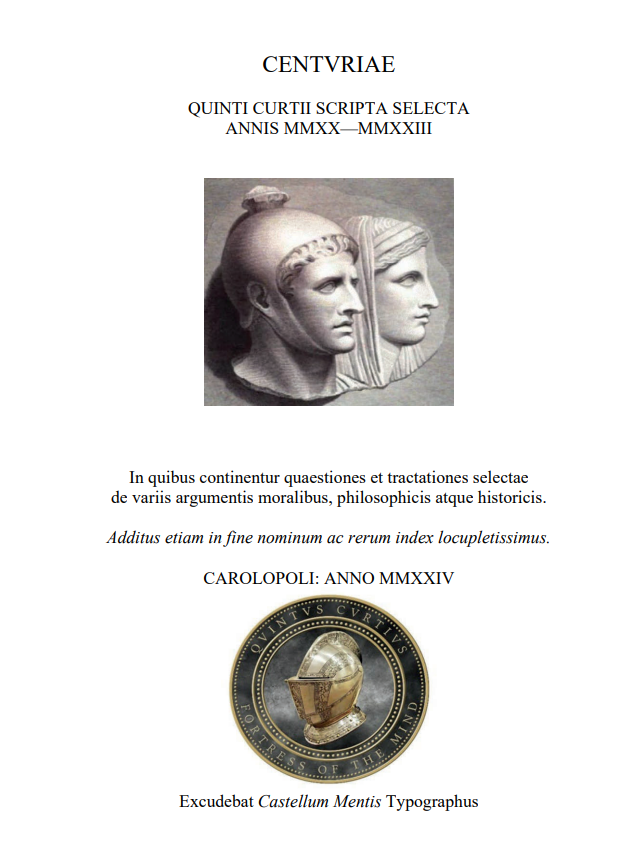
.
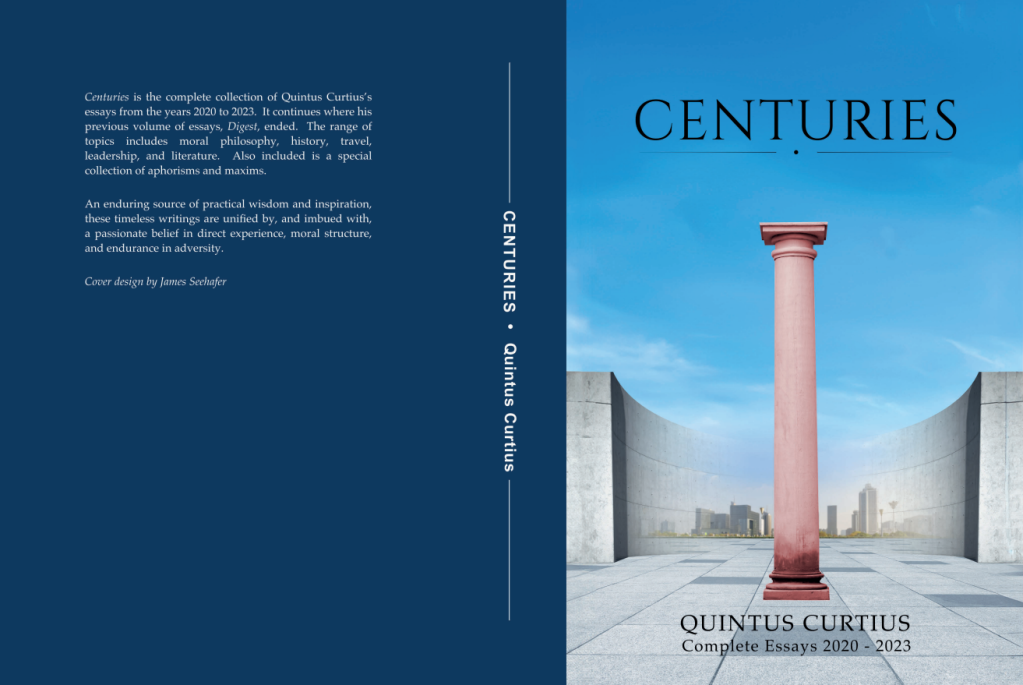
.
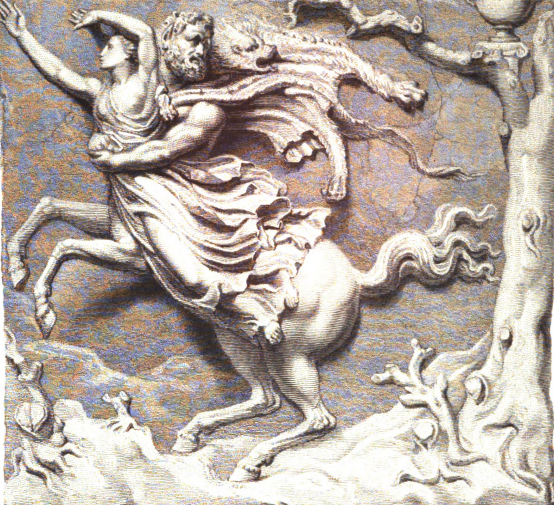
.
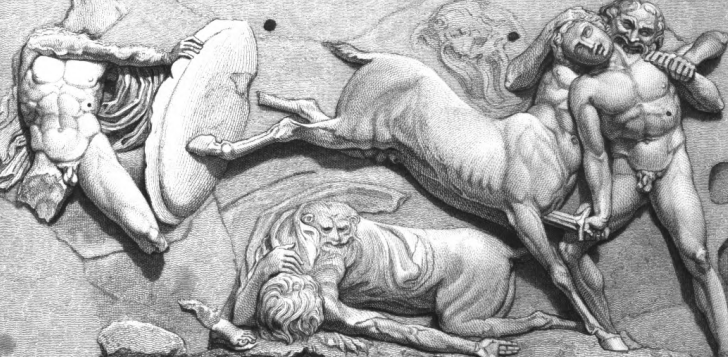
.
If you have questions about Centuries, please feel free to contact the publisher at qcurtius@gmail.com.
